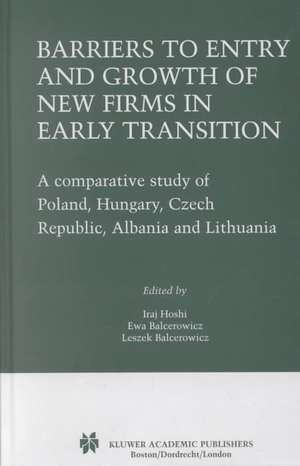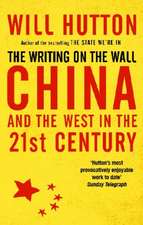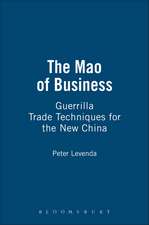Barriers to Entry and Growth of New Firms in Early Transition: A Comparative Study of Poland, Hungary, Czech Republic, Albania and Lithuania
Editat de Iraj Hoshi, Ewa Balcerowicz, Leszek Balcerowiczen Limba Engleză Hardback – 30 oct 2002
| Toate formatele și edițiile | Preț | Express |
|---|---|---|
| Paperback (1) | 946.87 lei 6-8 săpt. | |
| Springer Us – 4 oct 2012 | 946.87 lei 6-8 săpt. | |
| Hardback (1) | 953.03 lei 6-8 săpt. | |
| Springer Us – 30 oct 2002 | 953.03 lei 6-8 săpt. |
Preț: 953.03 lei
Preț vechi: 1162.23 lei
-18% Nou
Puncte Express: 1430
Preț estimativ în valută:
182.36€ • 190.88$ • 151.78£
182.36€ • 190.88$ • 151.78£
Carte tipărită la comandă
Livrare economică 31 martie-14 aprilie
Preluare comenzi: 021 569.72.76
Specificații
ISBN-13: 9780792374169
ISBN-10: 0792374169
Pagini: 348
Ilustrații: XVIII, 325 p.
Dimensiuni: 155 x 235 x 24 mm
Greutate: 0.66 kg
Ediția:2003
Editura: Springer Us
Colecția Springer
Locul publicării:New York, NY, United States
ISBN-10: 0792374169
Pagini: 348
Ilustrații: XVIII, 325 p.
Dimensiuni: 155 x 235 x 24 mm
Greutate: 0.66 kg
Ediția:2003
Editura: Springer Us
Colecția Springer
Locul publicării:New York, NY, United States
Public țintă
ResearchDescriere
inefficient and uncompetitive enterprises especially from the over-grown industrial sector. These initial conditions meant that, in the early stages of transition, the volume of entries and exits will be, by necessity, very high reflecting the large scale changes that had to take place before these economies attain a macroeconomic structure consistent with their level of development and with the needs of a market-based economy open to internationalcompetition. One of the main elements of the reform programme in all economies in transition was the liberalisation of entry conditions. Along with the liberalisation of prices and foreign trade, appropriate measures facilitating the establishment of new enterprises were approved in the very early phase of reforms in all of these countries. The effectiveness of liberalised entry conditions, of course, depends on the presence of appropriate legal and institutional framework in which new firms will operate. The establishment of a conducive legal and institutional environment, however, takes much longer. In practice, new firms come into existence before the rules of the game are properly established. These rules develop gradually and are not always, and everywhere, consistent with the aim of liberalising the entry conditions. The conditions facing new firms, therefore, have fluctuated in some countries in accordance with changes in the political environment and in line with the strength of different lobbies and interest groups.
Cuprins
List of Figures. List of Tables. Contributors. 1. Introduction and Overview; E. Balcerowicz, et al. Appendix 1.1. Enterprise Survey Questionnaire. 2. Fiscal and Regulatory Impediments to the Entry of New Firms in Five Transitional Economies; I. Hoshi, J. Mládek. 3. Investment and Finance in De Novo Private Firms: Empirical Results From the Czech Republic, Hungary and Poland; A. Bratkowski, et al. Appendix 3.1. Additional Econometric Results. 4. Foreign Direct Investment in Small Firms; M. Szanyi. 5. Barriers to Entry and the Unofficial Economy; J. Christian. 6. From Foe to Friend in 10 Years: Private Business Development in Hungary 1989 1998; M. Szanyi. 7. Barriers to Entry and their Impact on Private Sector Growth in Poland; E. Balcerowicz. 8. Barriers to Entry and their Impact on Firm's Performance in Albania; L. Xhillari, S. Telhaj. Appendix 8.1. Correlation Matrix. 9. Barriers to Entry of New Firms in the Czech Republic; J. Mládek, I. Hoshi. Index.












